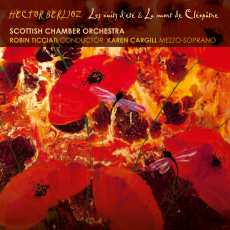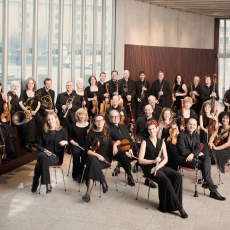Robin Ticciati - Scottish Chamber Orchestra - Berlioz: Les nuits d'ete - International Record Review
Berlioz's Les nuits d'ete, his setting of six poems by Theophile Gautier, who had described the composer, author Victor Hugo and painter Eugene Delacroix as the 'Trinity of French Romanticism', has been remarkably successful on disc. Its original 1841 incarnation was for tenor or mezzo and piano. Two years later, Berlioz orchestrated the fourth song 'Absence' for Marie Recio, but didn't orchestrate the rest of the cycle until 1856, changing the keys of 'Le spectre de la rose' (from D Major to a more mezzo friendly B Major) and 'Sur les lagunes' (from G minor to F minor). Even in that form, it's doubtful whether Berlioz ever conceived his cycle being performed by one singer. There are some recordings, such as the recent one on Opera Rara partnering Massenet's Le portrait de Manon, which utilize different singers, but when one voice type is chosen to present the entire cycle - with some songs necessarily transposed - mezzos just have the edge over their soprano colleagues.
Karen Cargill is up against some illustrious mezzo competition on disc, yet her ravishing account of Les nuits d'ete ranks up there with the best of them...
Comparing transpositions is interesting...the only common key choice is F Major for the opening song 'Villanelle'...Both Cargill and Graham sing the second and third songs in Berlioz's original key rather than the lower one of the 1856 orchestration; this is more surprising of Cargill, given that I find her voice much darker and fuller than Graham's...
Cargill's French diction is superb and in 'Le spectre de la rose.' the breathless hesitation of the line 'Mais . . . ne crains ... rien' is palpable. She is aided here by Robin Ticciati's fleet tempos and the almost period instrument clarity he draws from the Scottish Chamber Orchestra. 'Sur les lagunes' reveals Cargill's Wagnerian power at its most majestic, while she can scale her voice down to a wonderfully hushed whisper in 'Absence', where she is genuinely touching in the reprise of 'Reviens! Reviens!'.
The outer songs are perhaps the ones most difficult for mezzos to carry off successfully...Despite her recording's classic status, I have severe reservations about Baker's 'arch' pronunciation in these outer songs. Cargill, however, lightens her tone very well, aided by the fact that she takes 'L'ile inconnue' in the higher key of F Major. The SCO clarinets and bassoons gurgle away quite delightfully in the rippling arpeggios towards the conclusion.
From the perfumed delights of Les nuits d'ete, Cargill descends to the feverish, tragic depths of Cleopatra's fate in the composer's dramatic cantata in his fourth (failed) attempt to win the Prix de Rome in 1829. She offers a highly nuanced reading of La mort de Cleopatre, far more dramatic than the stately Olga Borodina for Valery Gergiev, luxuriating in the Vienna Philharmonic's velvet-upholstered strings.
Ticciati encourages his SCO strings to play with little or no vibrato. Allied to the sparser numbers of strings (8-6-4-4-2), this can lead to a glassy, undemourished quality, even compared with Herreweghe' s period band in Les nuits d'ete, employing a (marginally) larger number of string players...This is a disc to which I'll be returning soon and often.



